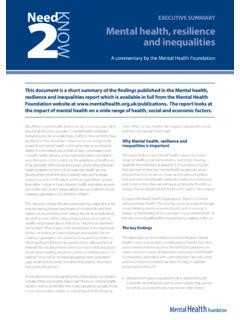Transcription of The Social Determinants of Mental Health
1 CLINICAL SYNTHESIS. The Social Determinants of Mental Health Michael T. Compton, , , and Ruth S. Shim, , It is well known that Social factors affect risk for Mental illnesses and substance use disorders, as well as Health outcomes of persons with these disorders. Social and environmental factors, in addition to their independent and combined effects, can in uence genetic Determinants of Health and illness through gene-by-environment interactions and epigenetic mechanisms. Such Social and environmental factors clearly have an effect at the individual level and should encounter intervention in the clinical setting.
2 However, the Social Determinants of Health and the Social Determinants of Mental Health exert their effects more broadly at the societal level and thus can be most effectively addressed through changes in public policies and Social norms. Speci cally, the Social Determinants of Mental Health exempli ed here by income inequality and poor education are understood as being underpinned by unequal distribution of opportunity and, more deeply, by public policies ( , legislation that may not speci cally pertain to Health but ultimately has far-reaching effects on Health ) and Social norms ( , cultural opinions and biases that set the stage for poorer Health among disadvantaged groups).
3 The greatest population-based impact for improving Mental Health and reducing risk of Mental illnesses and substance use disorders will be achieved by optimizing public policies to make them more Health promoting, and by altering Social norms so that the Health of all members of society is a priority. Focus 2015; 13:419 425; doi: Psychiatrists and other Mental Health professionals are cog- illnesses in recent decades, there has been broad awareness of nizant of the fact that the etiologies of Mental illnesses and the simultaneous relevance of biological, psychological, and substance use disorders are partly driven by Social risk factors.
4 Social factors to the onset and course of Mental (and physical). Whereas most psychiatric conditions have genetic under- illnesses. However, psychiatry has given less attention to the pinnings that are increasingly understood through ongoing Social factors at the societal, rather than just the individual, research, Social factors also contribute to risk, although to level and how those population-level, societal factors play varying degrees across diagnostic categories and across indi- a role in the epidemiology of behavioral Health conditions. viduals. Although the history of psychiatry may in part be To advance the prevention of chronic Health conditions, characterized by a shifting emphasis on biological versus so- such as hypertension, diabetes, chronic obstructive pulmo- cial explanations of risk, the widespread use of the bio- nary disease, and congestive heart failure, and many other psychosocial model in formulating both etiology and course/ illnesses.
5 The elds of medicine and public Health have in- outcomes testi es to the broad recognition of the importance creasingly homed in on Social risk factors and adverse Health of both biological and Social factors in shaping behavioral behaviors at the individual level and the Social Determinants disorders (1). To effectively treat and ultimately prevent Mental of Health at the societal level. The World Health Organiza- illnesses and substance use disorders (and promote Mental tion (2, 3) de nes the Social Determinants of Health as the Health more generally), our eld must carefully evaluate the conditions in which people are born, grow, live, work, and role that nongenetic Social and environmental factors play age and notes that these Determinants are shaped by the in bringing about poor Mental Health and in causing and multilevel distribution of money, power, and resources.
6 Such worsening Mental illnesses. In doing so, we must consider conditions include access to and quality of education for the roles of Social justice, political will and power, policy children and employment for adults, the distribution of action, resource distribution, and program development and wealth and other forms of opportunity within society, and implementation in addressing these factors. characteristics of housing and other built structures, to name The biopsychosocial model has served as a structure, pri- just a few. Understanding Health as in uenced by these so- marily for clinical formulations of individual patients, for cietal conditions places the responsibility of Health and several decades, and evidence and support for this approach Health equity rmly within the realms of politics, policies, have increased over time.
7 During the growing focus and re- and governance and encourages lawmakers to consider the search advances on the biological underpinnings of Mental Health impacts of all policies (2). Focus Vol. 13, No. 4, Fall 2015 419. Social Determinants OF Mental Health . FIGURE 1. Conceptualizing the Social Determinants of Mental Healtha a G 3 E, gene-by-environment interaction Despite long-standing recognition by psychiatrists and behind Social , environmental, and behavioral risk factors for other Mental Health professionals of the important effects of poor physical and Mental Health , as well as disease and individual-level Social factors on Mental illnesses and sub- morbidity.
8 It should be noted that our model is focused on stance use disorders, our eld has focused less on Social conditions in the United States, although the Social deter- factors that are best understood, and addressed, at the so- minants of Health clearly have ubiquitous (although varying). cietal level. The Social Determinants of Mental Health , which effects across countries. It could be argued that our model are largely the same as the Social Determinants of chronic pertains to an individualistic, urban, Western view of physical Health conditions, are addressable through policy the world.
9 Furthermore, we intentionally focus on socio- and programs, environmental change, and both collective environmental Determinants primarily at the level of society, and individual decisions within society. In this article, we rather than the family. We nonetheless acknowledge that provide an overview of the Social Determinants of Mental even in the Western world (and perhaps especially in the so- Health , discuss why they deserve special emphasis, and called collectivist countries of Asia), bene cial or adverse provide recommendations for how psychiatrists and other features stemming from within the family also play a central Mental Health clinicians can incorporate this perspective role in Mental Health and risk for Mental illnesses.
10 As such, into their work both within and outside of clinical settings. some of the factors considered and interventions suggested in this article are speci c to the United States. The effects and interventions to address the Social Determinants could CONCEPTUALIZING THE Social Determinants . be very different in other cultural or ethnic settings and OF Mental Health . between urban and rural settings within the same country. Our conceptualization of the Social Determinants of Mental With those disclaimers about our conceptualization Health presented in greater detail elsewhere (4) is shown aside, the nine Social factors and societal conditions in the in Figure 1, which attempts to dissect the driving forces shaded portion of Figure 1 are what we deem to be some of 420 Focus Vol.








